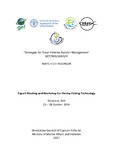| dc.description | In Indonesia, the issuance of Ministerial Decree No.2/PERMEN-KP/2015 on Prohibition of the use of Trawls and Seine Nets (trawl ban) dated 9 January 2015 has gradually stopped trawl fishing. According to this decree, the licenses for trawl and seine net gears that had been issued before the decree, were still valid until the license expired. The main goal of this Degree is to reduce the use and practices of destructive fishing gears in Indonesian waters. At present, the trawl and seine net fishing ban has completely taken place as all existing fishing licenses had expired on 9 January 2016. It is strongly believed that the shrimp resources have started to recover.
Furthermore, based on Ministerial Decree No.56/PERMEN-KP/2014 of 3 November 2014 on Moratorium for Fishing Vessels Built Abroad up until 30 April 2015 which was extended up until 31 October 2015 under Ministerial Decree No. 10/2015, less vessels are fishing in Indonesia waters. These two consecutive decrees completed a one year cycle of licensing system in Indonesia. Thus, there is currently no built-abroad vessels operating in Indonesia waters.
Consequently, Indonesia is facing challenges of finding alternative fishing technology for local vessels, especially to exploit shrimp resources. The initial idea of developing “Low Impact & Fuel Efficient (LIFE)” fishing gears has arisen lately. A comprehensive project to elaborate alternative LIFE fishing gears as well as other approaches to exploit shrimp resources is expected to start soon in Indonesia.
Indonesia is also promoting best practice for managing shrimp fisheries in Aru and Arafura Sea in order to ensure sustainable shrimp fisheries by managing fishing vessels activities in Aru and Arafura Sea based on fishing capacity.
There are many fisheries certification schemes globally. Each certification has a different purpose and own criteria, principles and procedures such as certification for environmental protection, IUU fishing, fisheries management, and protection of endangered, threatened and protected (ETP) species. The principal expected impact of these certifications is to encourage sustainable fishing practices by giving incentives in the form of price and market access.
To accelerate the steps in developing capacity of stakeholders on fishery certification and to obtain the information on certification and also for promoting LIFE fishing gears and other alternative approaches in Indonesia, a technical meeting was needed. | en |

